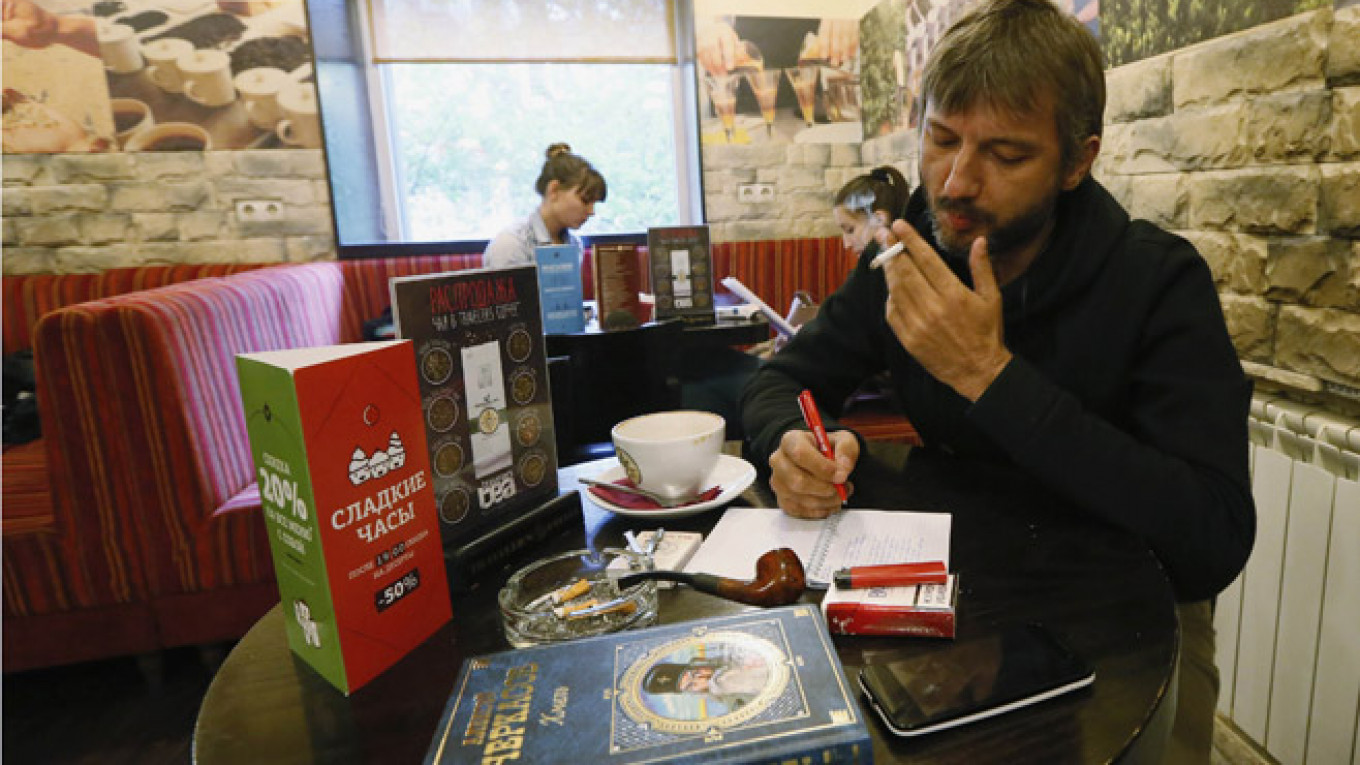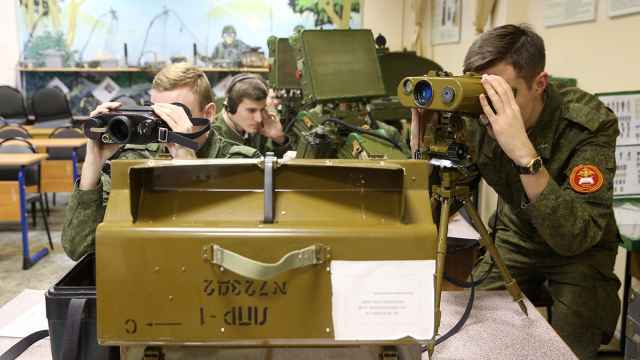Ashtrays were solemnly removed from tables and a prohibition on smoking was announced in Moscow's trendy Noor bar when the clock struck midnight on Sunday, signifying a momentous change for the city's nightlife.
With the new package of anti-smoking measures coming into force on June 1, Russia's 44 million-strong army of smokers will be forced to adapt to a new, more marginal status in places where they can be seen in public.
In February 2013, President Vladimir Putin approved legislation that forbade smoking in public places, required graphic warning labels on cigarette packs and banned the advertising of tobacco products. The law has been in force since June 2013, but some of its provisions, including a total ban on smoking in restaurants, trains and hotels, only came into effect on Sunday.
According to the World Health Organization, 34 percent of Russian adults were daily smokers in 2012. Restaurant patrons and bar hoppers are often confronted with a heavy veil of cigarette smoke, which permeates their hair, clothes and, of course, their lungs.
While Russians have largely hailed the new legislation as a victory, the country's restaurateurs have met their new obligations with irritation.
A Levada Center survey commissioned by the All-Russia Movement for the Rights of Smokers found that 82 percent of restaurant owners think a total ban on smoking is too rigid and that it will hurt their business. The survey was conducted among the managers of 124 restaurants across 48 Russian cities.
Another poll, conducted by state-run pollster VTSiOM in February said that 76 percent of Russians support the smoking ban in public spaces. The poll was conducted among 1,600 respondents with a margin of error not exceeding 3.4 percent.
Restaurant managers interviewed by The Moscow Times echoed the results of the survey, unanimously agreeing that the legislation would hurt the hospitality and restaurant industry.
"Our goal is to satisfy our customers," said Nikita Semenyuk, the manager of a branch of "Tanuki," Japanese chain restaurant. "But so many people smoke and if they are all told they are no longer allowed to do so when they come to our restaurant, I do not think they will be too happy."
Despite his apprehensions about potentially dissatisfied customers, Semenyuk conceded that the ban ultimately could make the restaurant environment more friendly — even for smokers.
"I smoke but I hate the smell of tobacco," he said. "It is really unpleasant to be in a room where there is too much smoke. I guess the new law will at least put an end to this phenomenon."
Restaurant and bar owners have also expressed doubt about their ability to enforce the new legislation when facing resistant or inebriated customers.
"I have no idea how we are going to enforce this," said Valentina, the owner of "Vstrecha," a small reception hall in northern Moscow, who declined to provide her last name. "We got rid of all ashtrays ahead of the ban so that people would get used to the idea that smoking won't be allowed. But when people start drinking, they want to smoke. I cannot begin to imagine how I will stop them."
Enforcement of the smoking ban has also been a struggle for Russian law enforcement.
Nikolai Gerasimenko, deputy chairman of the Duma's health care committee, told RIA Novosti on Friday that since Nov. 15, 2013, 100,000 fines had been handed out throughout the country for violations of the anti-smoking legislation, 30,000 of which were in Moscow.
Starting Sunday, an individual restaurant owner will be required to pay a fine of between 30,000 and 40,000 rubles ($860 to $1,150) if a customer is found smoking in his or her premises, while corporate businesses will be forced to part with larger sums ranging from 60,000 to 90,000 rubles ($1,720 to $2,580).
The Health Ministry said that since the introduction of the new anti-smoking law one year ago, Russia has already experienced a 16 to 17 percent drop in the number of smokers. Likewise, deaths caused by cardiovascular disease dropped by 15.7 percent in January 2014 compared to the same month last year, and by 7.6 percent in February compared to February 2013.
See also:
New Law Could Hit Russian Smokers With Massive Cigarette Price Hike
Contact the authors at [email protected] and [email protected]
A Message from The Moscow Times:
Dear readers,
We are facing unprecedented challenges. Russia's Prosecutor General's Office has designated The Moscow Times as an "undesirable" organization, criminalizing our work and putting our staff at risk of prosecution. This follows our earlier unjust labeling as a "foreign agent."
These actions are direct attempts to silence independent journalism in Russia. The authorities claim our work "discredits the decisions of the Russian leadership." We see things differently: we strive to provide accurate, unbiased reporting on Russia.
We, the journalists of The Moscow Times, refuse to be silenced. But to continue our work, we need your help.
Your support, no matter how small, makes a world of difference. If you can, please support us monthly starting from just $2. It's quick to set up, and every contribution makes a significant impact.
By supporting The Moscow Times, you're defending open, independent journalism in the face of repression. Thank you for standing with us.
Remind me later.






